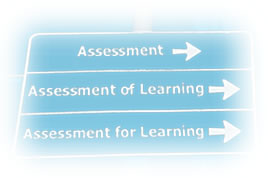

Links - Papers and Articles - Assessment in Schools
ETS Launches Online Test Item Bank Aligned To State Standards For Math And Language Arts. Electronic Education Report,12(5), 1-8. ![]()
This article reports on the launch of the ETS Formative Assessment Bank of 11,000 standards-based, K-12 math and language arts test questions available online by ETS
Hackling, M. W. (2002). Assessment of Primary Students Scienctific Literacy. Investigating: Australian Primary & Junior Science Journal, 18(3), 6-8. ![]()
The study focuses on the approach in assessing the teaching of scientific literacy on schools in
Jones, A. & Moreland, J. (2005). The importance of pedagogical content knowledge in assessment for learning practices: a case-study of a whole-school approach. The Curriculum Journal, 16(2), 193-206.
The article reports a research study on assessment for learning in
Eastern Heights Primary School began in 1998, with a focus on technology education as a new learning area
Pagett, L. (1996). Assessment: A contemporary perspective from an English primary school. Journal of Curriculum and Supervision, 12(1), 21-28.
The article mainly recalls the experiences of the author about educational assessment and discusses iImplementation of the Education Reform Act (ERA) and establishment of a national curriculum
Torrance, H. & Pryor, J. (2001). Developing Formative Assessment in the Classroom: using action research to explore and modify theory, British Educational Research Journal 27(5), 615-631.![]()
This article reports the outcomes of a research project designed to investigate and develop formative classroom assessment in primary schools. It reports on changes in classroom practice, particularly involving the clarification and communication of assessment criteria to pupils, and on the processes by which this came about.
Bennetts, T. (2005). The Links Between Understanding, Progression and Assessment in the Secondary Geography Curriculum. Geography, 90(2), 152-170.![]()
The article examines critically the relevance for progression of a range of theoretical concepts and models. After reviewing the current assessment patterns influencing secondary phase geography curricula in
Centre for Educational Research and Innovation (2005) Formative assessment: improving learning in secondary classrooms. Paris: OECD. ![]()
The study shows how formative assessment can be put into practice in schools and classrooms and suggests how policies can support this direction for educational improvement. Features exemplary cases from secondary schools in different countries are provided.
Hill, P. W. (2005). Future directions in public examinations & assessments. Paper presented at the The "Assessment Reform in Hong Kong" Seminar (September 24, 2005), The Hong Kong Institute of Education, Hong Kong.
Maxwell, G.S. (2004) Progressive assessment for learning and certification: some lessons from school-based assessment in Queensland. Paper presented at the 3rd. conference of the Association of Commonwealth Examination and Assessment Boards, March 2004, Nadi, ![]()
This paper is about some of the characteristics of school-based
assessment as practiced in Queensland for certification at the end of secondary education (the Senior Certificate), some of the principles that lie behind it and some of the lessons and caveats.
Wiliam, D., Lee, C., Harrison, C. & Black,P. (2004) Teachers developing assessment for learning: impact on student achievement. Assessment in Education.11(1), 49-65. ![]()
This paper reports on the achievement of secondary school students who worked in classrooms where teachers made time to develop formative assessment strategies.
Knight, P. T. (2002) Summative Assessment in Higher Education: practices in disarray. Studies in Higher Education, 27, 275-286. ![]()
The article begins with a view of learning and of what its assessment entails, arguing that it is helpful to distinguish between assessment systems primarily intended to provide feedout and those intended to provide feedback. Attention is then concentrated on summative, feedout, or high stakes assessment, which is supposed to be highly reliable. A number of difficulties with current practices are then identified.
Maclellan, E. (2001). Assessment for Learning: the differing perceptions of tutors and students. Assessment & Evaluation in Higher Education, 26(4), 307-318![]()
The purpose of this study was to describe assessment practices as these were experienced by tutors and students in one higher education establishment.
Maclellan, E. (2004). How convincing is alternative assessment for use in higher education? Assessment and Evaluation in Higher Education. 29(3), 311-321. ![]()
The paper argues that task specification and marking consistency in alternative assessment can make comparability of performance difficult to effect, thereby leaving alternative assessment a less than convincing form for use in higher education.
Nieweg, M. (2004) Case study: innovative assessment and curriculum redesign, Assessment and Evaluation in Higher Education, 29(2), 203-214. ![]()
It reports a case study in the Institute for Physiotherapy, part of the Hogeschool van Amsterdam in the
Taras, M. (2002). Using Assessment for Learning and Learning from Assessment, Assessment & Evaluation in Higher Education, 27(6), 501 - 510. ![]()
This article looks briefly at the aims of higher education, provide an overview of current thinking on student learning and formative assessment as a framework for offering one possible practical solution to the problem.
Williams, K. (2005). Lecturer and first year student (mis)understandings of assessment task verbs:'Mind the gap'. Teaching in Higher Education, 10(2), 157-173.
This paper examines the way in which a cohort of first year Chemistry students interpreted commonly used assessment task verbs and compared these responses with their lecturers' usage of these terms
Home | Purposes | Background | Research Plan | Team | Schools | Works | Links